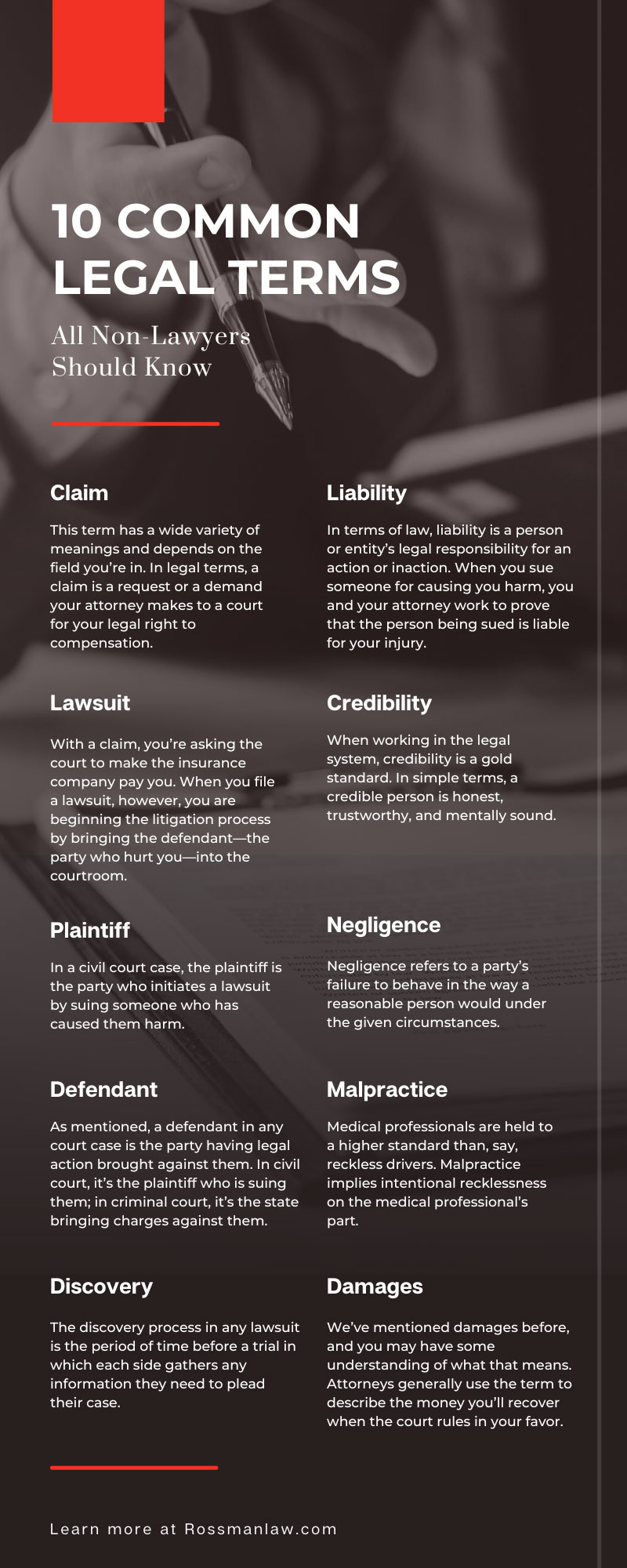
Hospital Negligence & Facial Nerve Paralysis
November 11, 2022
Important Boating Accident Statistics Everyone Should Know
November 29, 2022Even if you are not in the legal profession yourself, it will benefit you to know how lawyers talk and what they mean when they use legal terminology. Rossman Law Group has compiled a convenient guide to common legal terms that all non-lawyers should know. Next time you meet with an attorney, you’ll have a firmer grasp of the language they use, and you’ll be able to communicate with them more effectively.
Claim
This term has a wide variety of meanings and depends on the field you’re in. In legal terms, a claim is a request or a demand your attorney makes to a court for your legal right to compensation. For example, if you file a personal injury claim, you are asking the court to enforce your right to be remunerated for your ordeal.
Lawsuit
While “claim” and “lawsuit” are often used interchangeably, they are separate legal actions.
With a claim, you’re asking the court to make the insurance company pay you. When you file a lawsuit, however, you are beginning the litigation process by bringing the defendant—the party who hurt you—into the courtroom.
The lawsuit process begins with a claim, but it also requires you to serve the defendant with a summons letting them know that you’re suing them.
Plaintiff
In a civil court case, the plaintiff is the party who initiates a lawsuit by suing someone who has caused them harm. If you’ve been hurt in an accident and have hired a catastrophic injury attorney to help you file a lawsuit, you are the plaintiff.
Occasionally, a plaintiff is also called a claimant because they’re the one bringing the claim to the court’s attention.
Defendant
As mentioned, a defendant in any court case is the party having legal action brought against them. In civil court, it’s the plaintiff who is suing them; in criminal court, it’s the state bringing charges against them.
If you have recently received a summons to appear in court, that means somebody is suing you, which makes you the defendant.
Discovery
The discovery process in any lawsuit is the period of time before a trial in which each side gathers any information they need to plead their case. A defendant’s attorney may request certain records or other information from the plaintiff or vice versa.
There are three main types of discovery:
- Written: Exchanges between parties that take place on paper or via email, like questions to answer under oath or clarification of case facts.
- Oral: Sworn statements, usually delivered in depositions, from individuals involved with the case.
- Document production: Any exchange of physical or electronic documents and records that are relevant to the case.
The discovery process helps both the plaintiff and the defendant get a clearer picture of the case in its entirety. It also helps to prevent “gotcha” moments and surprises at trial.
Liability
In terms of law, liability is a person or entity’s legal responsibility for an action or inaction. When you sue someone for causing you harm, you and your attorney work to prove that the person being sued is liable for your injury.
It is not exactly the same as guilt, which is a term used in criminal cases. However, the end result is similar—if a defendant is found to be liable for a plaintiff’s injury, the court will order the defendant to pay damages.
Credibility
When working in the legal system, credibility is a gold standard. In simple terms, a credible person is honest, trustworthy, and mentally sound.
Credibility is essential in any case where each side is telling a very different version of a story. If you, as a plaintiff, insist that a defendant directly caused your injury, the defendant’s attorney and insurance company may try to poke holes in your credibility. They might do this by asking you questions off the record or looking into your social media to see if you’re exaggerating your injuries.
Being open and honest with your attorney is a powerful way to establish your credibility right off the bat. If you can produce records that back up your claims, your credibility will be more difficult to damage.
Negligence
You may have an idea of what negligence looks like, but this term has a specific definition in the legal world. Negligence refers to a party’s failure to behave in the way a reasonable person would under the given circumstances. There are negligent actions, like prescribing the wrong medication, and negligent omissions, like failing to read a medical chart thoroughly before providing a diagnosis.
The key question to ask in negligence cases is, “Would a reasonable person have done this if they were in the same situation?”
Malpractice
Malpractice is similar to negligence, but it takes the concept a step further. Medical professionals are held to a higher standard than, say, reckless drivers. Malpractice implies intentional recklessness on the medical professional’s part.
To prove medical malpractice in court, you and your attorney will need to confirm four elements:
- Duty: The doctor in question was responsible for your care.
- Breach: They failed to provide you with medical care that was up to their community’s standard.
- Causation: That breach of care was directly responsible for your illness or injury.
- Damages: You suffered a substantial and compensable loss due to that illness or injury.
Damages
We’ve mentioned damages before, and you may have some understanding of what that means. Attorneys generally use the term to describe the money you’ll recover when the court rules in your favor. Damages are the losses you suffered that can be compensated with money.
Damages can be broken down into a few sub-categories:
- Economic damages refer to money you lost during your ordeal, like medical costs and lost wages, that your settlement aims to compensate.
- Non-economic damages are often called pain and suffering damages, meant to compensate you for the emotional toll the illness or injury took on you.
- Punitive damages are, as the name implies, meant to punish the defendant for their wrongdoing.
Even if you do not have a legal background, you can speak more effectively with your attorney when you know these common legal terms. All non-lawyers should know these basic legal terms, as this knowledge will help you feel more empowered and involved in the litigation process.






